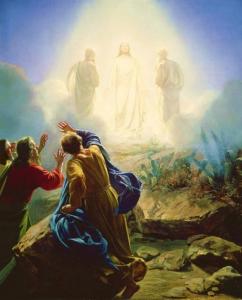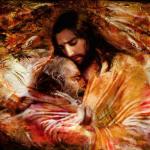“Please Hit ‘Subscribe’”! If you have received benefit from this or any of my other 4,600+ articles, please follow this blog by signing up (with your email address) on the sidebar to the right (you may have to scroll down a bit), above where there is an icon bar, “Sign Me Up!”: to receive notice when I post a new blog article. This is the equivalent of subscribing to a YouTube channel. Please also consider following me on Twitter / X and purchasing one or more of my 55 books. All of this helps me get more exposure, and (however little!) more income for my full-time apologetics work. Thanks so much and happy reading!
Johann Eck (1486-1543) was a German Catholic theologian, who was arguably one of Martin Luther’s two most important and formidable debate opponents, along with Erasmus (I’ve compiled several of his devastating replies to Luther as well). He was ordained as a priest in 1508 and in 1510 was installed as a professor of theology at the University of Ingolstadt in Bavaria: which lasted for thirty years. He mastered both Greek and Hebrew and had a prodigious memory, boundless energy, and very considerable debating skills. He famously engaged Luther for eighteen days in the Leipzig Disputation of July 1519.
Eck’s argumentation might be said to be one of the quintessential examples of the Catholic theological and polemical response to the Protestant Revolt up to the opening of the Council of Trent in 1545. This is one of many excerpts from his best-known and principal volume, Enchiridion of Commonplaces Against Luther and Other Enemies of the Church. It first appeared in 1529 and eventually went through 91 editions. I will be using a later edition from 1541 (translated by Ford Lewis Battles, Grand Rapids, Michigan: Baker Book House, 1979; now in the public domain).
Eck’s words will be in black; my interjections in blue, and citations from Luther and other famous Protestants in green. I use RSV for scriptural citations.
***
The Saints as friends of God ought to be implored to intercede for us, and although the Saints are not to be worshiped with latria, because this is owed to God alone, yet they are to be venerated with dulia. John 12:26: “If any man minister to me, him will my Father who is in heaven honor.” If therefore God honors the saints why should we not honor the saints? “So long as you do this to one of the least of these my brothers, you have done it unto me” [Mt 25:40]. Therefore honor shown to the saints is shown to God.
“But to me thy friends, 0 God, are made exceedingly honorable; their principality is exceedingly strengthened” [Ps 139:17].
“If Moses and Samuel shall stand before me, my soul is towards this people” [Jer 15:1]. . . . There Jeremiah is manifestly hinting that the saints pray for the people.
“Call now if there be any that will answer you, and turn to someone of the saints” [Job 5:1]. These words, indeed, although Eliphaz the Temanite spoke them to Job, yet Job did not rebuke them, but received them as the salutary advice of a friend. Thus also Elihu said: “If there shall be an angel speaking for him, one among like ones, to declare man’s uprightness, he (that is, God) shall have mercy on him, and shall say: Deliver him, that he may not go down to corruption, I have found wherein I may be merciful to him” [Job 33:23f].
“Go to my servant Job, and offer for yourselves a holocaust. . . his face I shall accept, that folly may not be imputed to you . . .” [Job 42:8]. And later: “The Lord also was turned toward the penance of Job, when the latter prayed for his friends [Job 42:10].
Jacob said: “. . . and let my name be called upon them, and the names of my fathers Abraham, and Isaac . . .” [Gen 48:16].
Moses said to him: “Let thy anger cease, and be appeased upon the wickedness of thy people. Remember Abraham, Isaac, and Israel … to whom thou swarest by thy own self, saying: I will multiply your seed as the stars of heaven” etc. [Ex 32:12f]. And there follows: “The Lord was appeased upon the wickedness of his people” [cf. Ex 32:14]. Azarias in the fiery furnace prayed, saying: “Deliver us not up for ever . . . for thy name’s sake, and abolish not thy covenant. And take not away thy mercy from us for the sake of Abraham thy beloved, and Isaac thy servant, and Israel thy holy one, to whom thou hast spoken, promising that thou wouldst multiply their seed as the stars of heaven, and as the sand that is on the sea shore” [Dan 3:34-35]. And he was freed with his companions from the fiery furnace.
“O Lord Almighty, God of Israel, hear now the prayer of the dead of Israel and their sons who have sinned before thee” [Bar 4 3:4], etc.
“Judas Maccabeus saw Onias extending his hands to pray for the people of the Jews; after this he saw another man wonderful in age and glory, concerning whom Onias said: he is the lover of the brethren and of the people of Israel, who prays much for the people and the whole holy city, Jeremiah, the prophet of God” [2 Macc 15:12-14].
If the fathers of the Old Testament in limbo, not yet blessed with the clear vision of the divine countenance, were praying for their own, how much more are the saints in eternal blessedness contemplating ceaselessly God face to face, to be believed to be praying for us.
“In as much as you have done to one of the least, my brothers, you have done it unto me” [Mt 25:45]. Therefore if honor is shown to the saints, honor will be shown to God.
“For this every saint will pray to thee in a suitable time” [Ps 37:6]. The Hebrews read “every merciful one”: the blessed moreover are saints and merciful.
Absalom, reconciled to his father yet for two years stopping in Jerusalem, did not see the face of his father [2 K 14:24ff]. Thus the sinner reconciled to God does not immediately present himself to God, but through mediators and intercessors.
Solomon ordered a throne to be placed for his mother next to his own [1 K 2:19]. The true peacemaking Solomon, Christ, honoring his mother, does the same thing. . . .
All honor which we direct to the divine Virgin redounds to Christ, Son of God and of the Virgin: we honor the Virgin as mother in the Son, and the Son in the Virgin mother. . . .
The angels pray for us: “The angel of the Lord shall encamp round about them that fear him, and shall deliver them” [Ps 34:8].
“For he has given his angels charge over you, to guard your ways” [Ps 91:11].
The angel prays for the Jewish people: “0 Lord of hosts, how long wilt thou not have mercy on Jerusalem, and on the cities of Judah, with which thou hast been angry? . . . And the Lord answered the angel . . . good, comfortable words” [Zech 1:12f].
“The four living creatures and the twenty-four elders fell down before the Lamb, having every one of them harps, and golden vials, full of odors, which are the prayers of the saints” [Rev 5:8]. ” . . . the angel stood before the altar, having a golden censer, and there was given to him much incense, that he should offer of the prayers of all saints upon the golden altar, which is before the throne of God. And the smoke of the incense from the prayers of the saints ascended up before God from the hand of the angel” [Rev 8:3f].
“Are they not all ministering spirits, sent to minister for them, who shall receive the inheritances of salvation?” [Heb 1:14]. Therefore angels support us: why then is it not permitted to call upon their support [suffragia] and ministry?
And the same reason applies to the saints as to the angels whose equals they are in the kingdom of heaven [Lk 20:36; Mt 22:30; Mk 12:25].
“No word overcame him (Elisha), and after death his body prophesied; in his life he did great wonders, and in death he wrought miracles” [Ecclus 38:14f].
1. Christ intercedes for us according to his humanity before God the Father. “For Christ Jesus makes intercession for us” [cf. Heb 7:25].
“Jesus has an everlasting priesthood, whereby he is able also to save forever, those who come to God by him, always living to make intercession for us” [Heb 7:24f].
“But if any man sin, we have an advocate with the Father, Jesus Christ the just: and he is our propitiation for our sins, and not for ours only, but also for those of the whole world” [1 Jn 2:1f].
If therefore Christ as head prays for us, why not also the saints his members, (who conform themselves to Christ) asking with him[?] . . .
If the living pray for one another, why do the blessed dead not also do this, who are more perfect in charity and more powerful with God and purer in mind? . . . God wills to be called upon through his saints, “I sought among them for a man who might set up a hedge and stand in a gap before me in favor of the land, that I might not destroy it, and I found none” [Ez 22:30].
[Objection] Christ alone, God, is to be called on because he alone is sufficient. He alone is most generous and most merciful, loving us more than all saints do. “If you ask the Father anything in my name, he will give it you” [Jn 16:23]. “Ask and you shall receive; seek and you shall find” [Lk 11:9]. “All things whatever you shall ask in prayer, believing, you shall receive” [Mt 21:22]. “Let us go therefore with confidence to the throne of his grace, that we may obtain mercy, and find grace in seasonable aid” [Heb 4:16].
[Reply] We confess that what is to be prayed for is to be prayed in the name of Jesus, is to be prayed for with assurance, yet that does not exclude the saints, because also through the saints as members we pray in the name of Jesus their head. Hence the Church concludes that the collects of the saints are through Christ our Lord. And although God is best and most merciful, yet he is also most orderly, disposes all things sweetly, and draws the lower things through the middle things to the higher things, as Dionysius says.
[Objection] “There is one mediator of God and men, Christ Jesus” [1 Tim 2:5]. Why then do we want to make from among the saints
more mediators?
[Reply] There is one mediator of redemption, Jesus Christ, because he alone has redeemed the human race; there is no other name under heaven in whom we are to be saved, but there are very many mediators of intercession. Therefore there is one mediator through redemption, just as also there is one savior. For he alone is the good shepherd who has given his life as redemption for many. But there are many mediators through intercession, just as also Scripture mentions very many saviors. Moses says “I was the mediator and stood between the Lord and you” [Deut 5:5]. “Likewise he raised them up a savior [RSV: “deliverer”] Othoniel” [Judges 3:9]. . . .
***
We honor, venerate, invoke . . . God and His saints, yet in an unequal manner. Him (because He is first and beginning of being and conserving and governing for all, and alone gives grace and glory) we worship with latria, which is owed to Him alone in accordance with the Scripture: “You shall adore the Lord your God, and Him alone you shall serve” (Dt 6:13; Mt 4:10). And again: “To God alone be honor and glory” (1 Tim 1:17).
And with this adoration Mordecai would not adore Haman, fearing lest he might transfer to a man the honor owed to God (Esther 3:2). And the angel forbade John from wanting to worship him (Rev 22:8 f). The saints as intercessors and patrons, not as conferers of grace and glory, but (by their merits and prayers) as obtainers of requests with God, and thus far beneath God, we venerate, honor, and invoke with dulia. (which is shown to excellent creatures as a sign of reverence) but the Virgin, bearer of God, by hyperdulia. . . .
In the litany the Church teaches the difference between the invocation or adoration of God and of the saints, where first of all the Holy Trinity is invoked under the distinction of persons and the unity of essence, to have mercy upon us. Then the intercession of the saints is implored, to pray for us. Finally, the litany returns to God that He may deign to hearken to us while the saints are praying together with us, may free us from evil, grant us grace, and bestow eternal life. The Church observes a similar form of prayer in the . . . “collects” which are said on the festivals of the saints, where we implore divine clemency through the merits and intercessions of the saints. It concludes with: “Through our Lord Jesus Christ, who with thee lives and reigns” etc.
The invocation of the saints is not explicitly enjoined in the Scriptures. Not in the Old Testament: where the people had otherwise slipped into idolatry, and the fathers were in limbo, not yet blessed. “Abraham has not known us’, and Israel was ignorant of us” (Is 63:16). Under the Gospel too there was no precept, lest the Gentiles being converted might believe themselves once more led back into the cult of those born of earth, so they would have worshiped (according to the old custom) the saints not as patrons, but as gods: just as they wanted at Lycaonia to sacrifice to Paul and Barnabas (Acts 14:10). Now if the Apostles and Evangelists had taught that the saints were to be venerated, they would have been blamed for arrogance, as if they themselves had sought that glory after death. Therefore he would not teach by express scriptures the veneration of saints, . . .
***
*
Practical Matters: Perhaps some of my 4,600+ free online articles (the most comprehensive “one-stop” Catholic apologetics site) or fifty-five books have helped you (by God’s grace) to decide to become Catholic or to return to the Church, or better understand some doctrines and why we believe them.
Or you may believe my work is worthy to support for the purpose of apologetics and evangelism in general. If so, please seriously consider a much-needed financial contribution. I’m always in need of more funds: especially monthly support. “The laborer is worthy of his wages” (1 Tim 5:18, NKJV). 1 December 2021 was my 20th anniversary as a full-time Catholic apologist, and February 2022 marked the 25th anniversary of my blog.
PayPal donations are the easiest: just send to my email address: [email protected]. Here’s also a second page to get to PayPal. You’ll see the term “Catholic Used Book Service”, which is my old side-business. To learn about the different methods of contributing (including Zelle), see my page: About Catholic Apologist Dave Armstrong / Donation Information. Thanks a million from the bottom of my heart!
*
***
*
Photo credit: Transfiguration of Jesus [Elijah and Moses also appearing], by Carl Heinrich Bloch (1834-1890) [public domain / Wikimedia Commons]
Summary: One of a series of posts documenting the Catholic apologetics efforts of Johann Eck (1486-1543) against Protestantism. This entry addresses veneration of saints.














